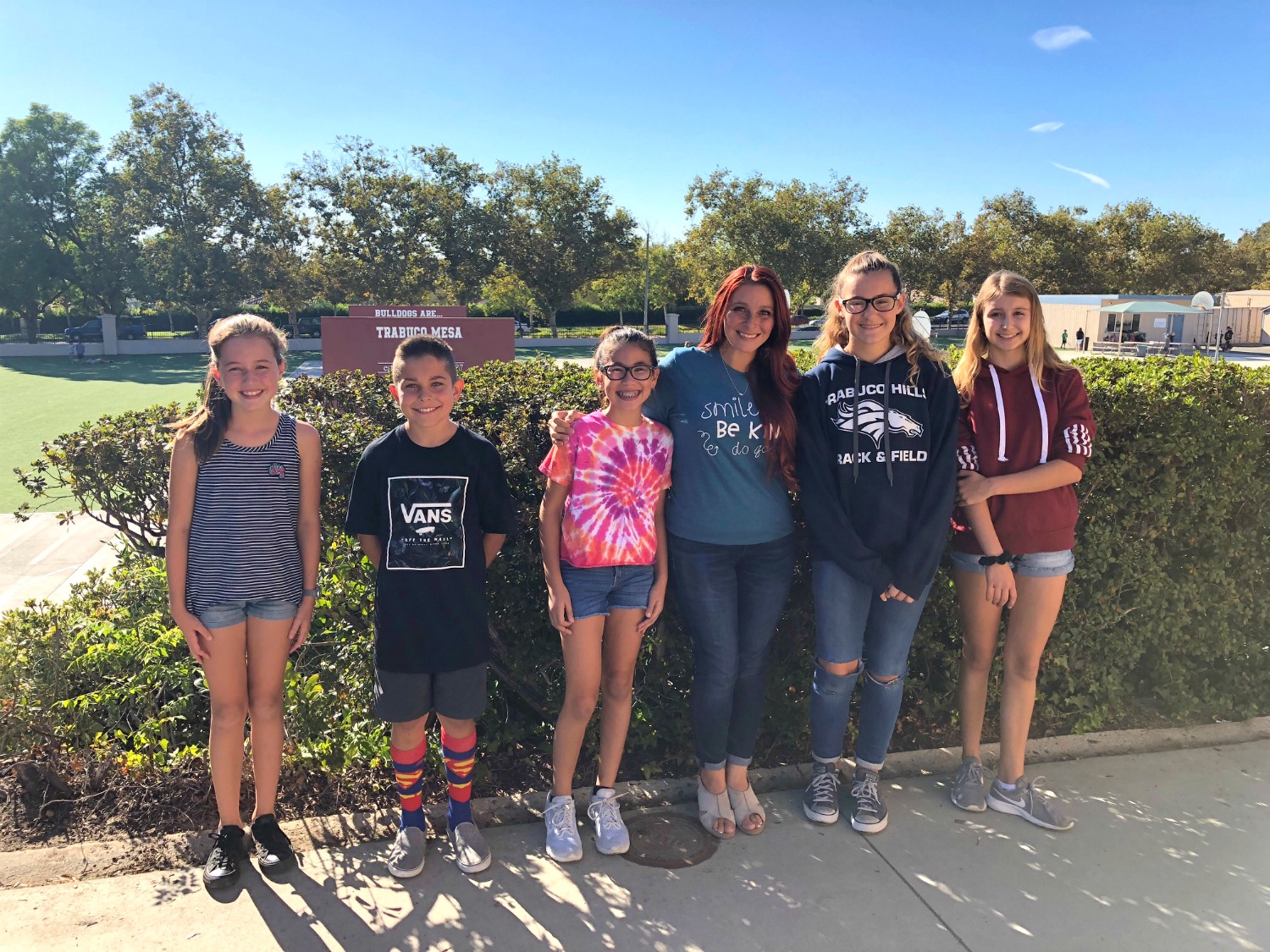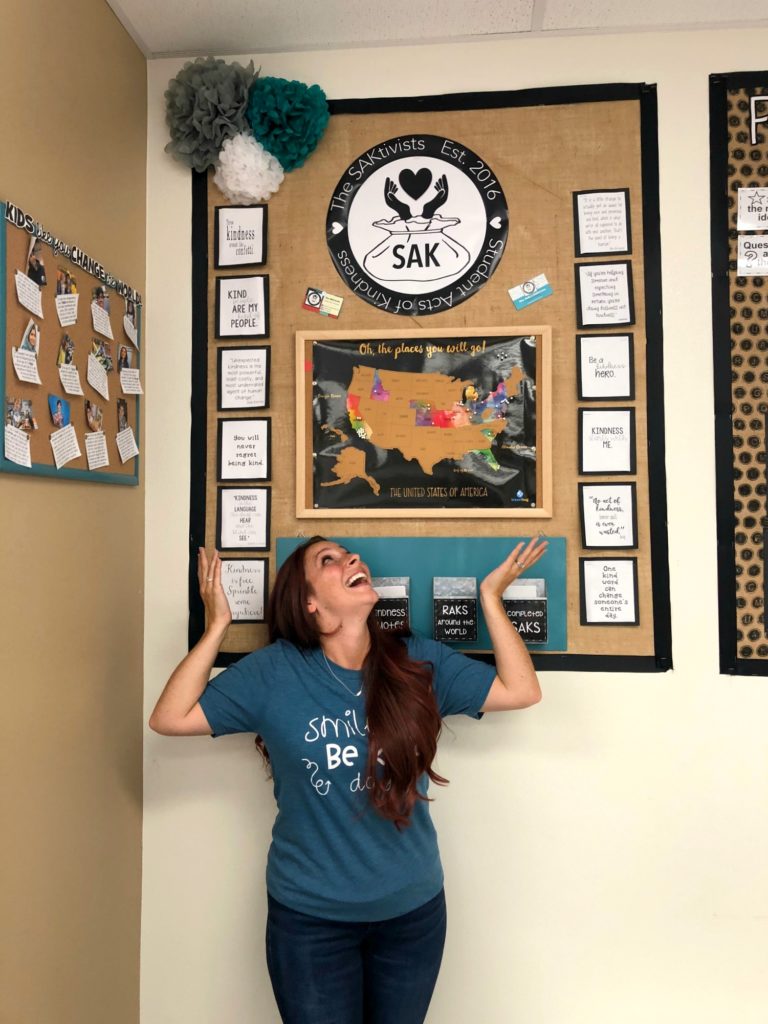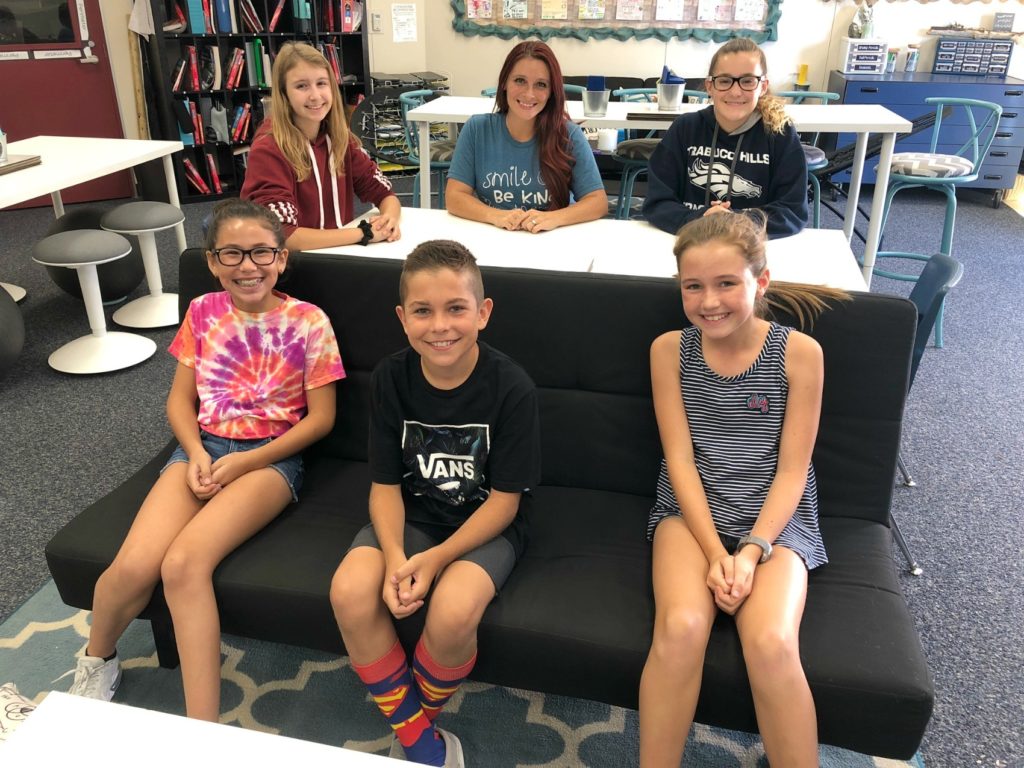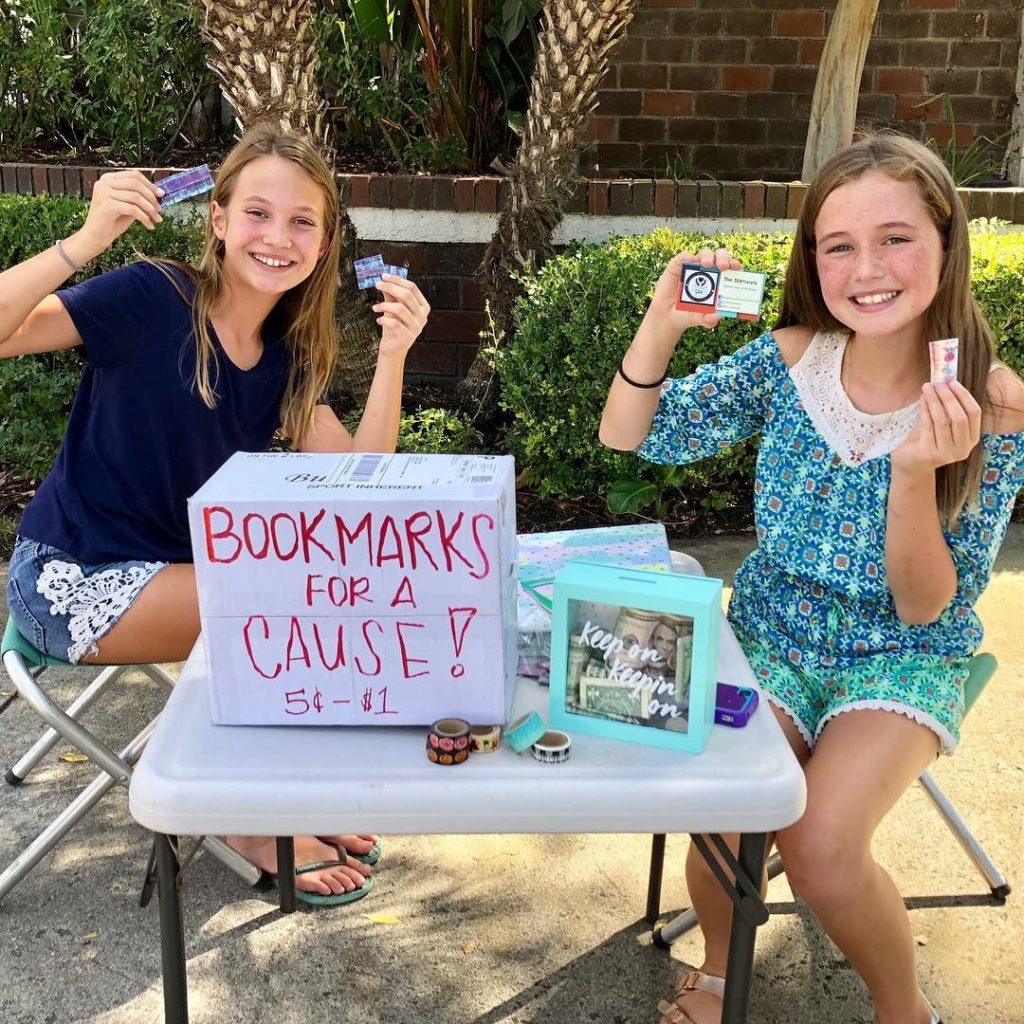
It began with a simple classroom assignment: Perform one random act of kindness every day for a month, and write it down.
But by the end of December 2016, the sixth-graders in Mandy Kelly’s class at Trabuco Mesa Elementary School weren’t ready to quit kindness.
So they kept it going the next month. And the month after that. And the month after that.
“They just ran with it,” Kelly said. “I had no plan or path for where I was going to take this. It just started from an idea for them to think outside of themselves during the holiday season.”
[Trabuco Mesa Elementary teacher Mandy Kelly has been named one of six OC Teachers of the Year for 2020. Read the OCDE Newsroom’s coverage to find out who else won the honor.]
Sometime around January, students came up with a team name, dubbing themselves the “SAKtivists.” (The first three letters stand for “Student Acts of Kindness.”) They also came up with a logo. Then the class had the idea of creating business cards that could be passed out with each good deed, encouraging recipients to pay it forward.
That first year, the SAKtivists bought drinks for strangers at Starbucks. They left kind notes on the desk of second-graders. They taped candy and microwavable popcorn to a Redbox movie rental kiosk at the grocery store. They handed out water to joggers at a nearby lake. They wrote thank-you letters to troops. They gave balloons to kids in the park. And they started documenting it all on social media.
Eventually the school year came to an end, but the SAKtivists kept going.
‘Anyone can be kind’
The project continued the following year at Trabuco Mesa — the campus, serving pre-K students through grade six, is located in Rancho Santa Margarita in the Saddleback Valley Unified School District — and by then other teachers were asking how they could get involved.
So this summer Kelly decided to scale up the operation. Her class now produces weekly videos challenging others to become SAKtivists by performing specifics acts of kindness. They even created an online form to connect with other K-12 classes.
 “Within two weeks, we got classes from 67 schools participating,” she said. “We’re across 16 different states. And then we have a class in Ireland, a class in Scotland, a class in England and a whole school in Canada that takes on our challenges every week.”
“Within two weeks, we got classes from 67 schools participating,” she said. “We’re across 16 different states. And then we have a class in Ireland, a class in Scotland, a class in England and a whole school in Canada that takes on our challenges every week.”
Kelly says kindness doesn’t have to take the form of a grand gesture to make a difference. In fact, the video challenges issued by her class are often pretty simple tasks.
They kicked off the school year by encouraging students to spend time with someone new on campus. Since then, they’ve asked kids to help out around the house and challenged their peers to hold doors open for others.
“We really try to make sure every challenge can be done by anyone in any socioeconomic background, any kind of home life,” said Kelly. “Anyone can be kind. I’ve been so amazed and just so touched at how much it’s changed the culture within the classroom.”
To date, she estimates that more than 1,000 acts of kindness have been performed by the SAKtivists, and hundreds — or perhaps thousands — more have come in response to their challenges. Kelly said she plans to add them to OCDE’s One Billion Acts of Kindness campaign.
Kindness becomes contagious
Eighth-graders Kyra Donovan and Denali Harps were there from the beginning, members of the original class that got the whole kindness ball rolling nearly two years ago.
“I remember getting a calendar just for December and we had to write down something we’d do each day,” said Denali, 13. “And I remember I just couldn’t wait to help out, so I would find excuses to do mine early and then think of new things to do. Helping out was fun.”

One of Denali’s favorite ways to spread kindness was to make cookies for others. Her classmate Kyra, also 13, took a different approach. She recalls taping pennies to cards and leaving them next to a fountain at a local mall, inviting shoppers to “Make a wish.”
“It was really cool to see because I went up on the second level and just kind of watched people,” she said. “And it was really cool to see all of these people with an array of ages just walking to the fountain and just looking at them and being like, ‘Wow!’”
Both students have found kindness to be habit-forming, with altruism continuing to shape their lives.
“It definitely influenced me even outside of school,” she said. “For example, I started going to my church food pantry every week because I was like, ‘OK, I need to help these people who don’t have enough resources or money to be able to get the food that they need.’ And I felt like, even though I was just organizing cans or whatever I was doing that day, I felt — I don’t know — bigger than myself.”
“Just seeing an opportunity and taking it, it just creates such a great habit and a love for loving others later in life,” Denali said, “and I think that’s really important, especially when there’s a lot of bad in the world.”
The kids are alright
These days, a new crop of sixth-graders has taken the kindness baton in Ms. Kelly’s class, posting their acts of altruism to Facebook, Twitter and Instagram.
Rilan, 11, recently sold homemade bookmarks to raise money for groups such as the ASPCA and Save the Seals. Other students have been offering to help make dinner or carry bags for others at the grocery store.
 “I have two younger brothers,” said Jonny, 12. “One of them’s 6, one of them’s 3. And you just have to be kind to them. Even if they’re not being very nice, even if they’re trying to steal a toy from you, you just let them have it. You’re like, ‘All right, you can have it. I don’t want to argue.’”
“I have two younger brothers,” said Jonny, 12. “One of them’s 6, one of them’s 3. And you just have to be kind to them. Even if they’re not being very nice, even if they’re trying to steal a toy from you, you just let them have it. You’re like, ‘All right, you can have it. I don’t want to argue.’”
This generation of SAKtivists issues a new challenge each Monday, leveraging their video production skills. On Friday, they share a second weekly video to give shoutouts to participants, choosing four or five at random.
“So, we’ll say, ‘This shoutout goes to Katie in Illinois. This is what she did. This shout out goes out to John in Wisconsin, and this is what he did,’” Kelly said.
To keep track of the different schools participating in the U.S., the class has hung a map on the wall, dotting it with push-pins. Plenty of states have yet to join, but the pins continue to multiply, each representing untold numbers of kind acts.
“Mind-blowing” is how Rilan describes their impact so far. “It’s crazy,” she said.
“Being able to know that you’re spreading kindness around the world is just amazing,” added Sydney, 11.
And it all started with some blank calendars handed out by a teacher who considers kindness and compassion just as essential as academic success.
“If students finish the year not knowing the different dynasties of China, they’ll survive,” Kelly said. “But if they leave here not knowing how to be a good person then I didn’t do my job.”
Don’t forget to log your kind acts on the kindness1billion.org website, or download our free app for iOS and Android devices. And be sure to listen to the “Exploring Kindness” episode of The Deeper Learning Podcast, hosted by Orange County Superintendent Dr. Mijares.
